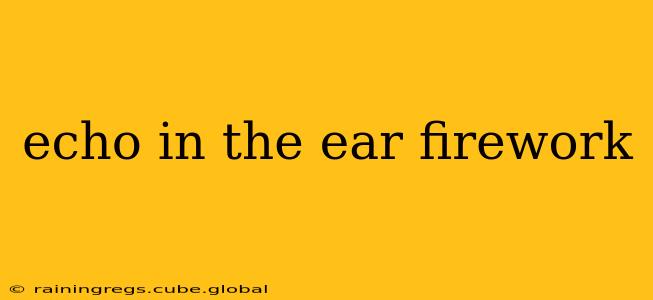Fireworks are a spectacular display of light and sound, bringing joy and excitement to celebrations worldwide. However, one often-overlooked aspect of fireworks is the distinct "echo" or ringing sound some people experience afterward, particularly in the ear. This sensation, while generally harmless, can be concerning and warrants understanding. This article will delve into the science behind this echo effect, address common concerns, and provide safety advice for firework enthusiasts.
What Causes the Echoing Sound in My Ear After Fireworks?
The echoing sound, sometimes described as ringing, buzzing, or a muffled feeling, isn't actually an echo in the traditional sense. Instead, it's a temporary disruption to the delicate structures within the inner ear. The incredibly loud explosions of fireworks generate powerful sound waves that can overstimulate the hair cells in the cochlea, the organ responsible for hearing. This overstimulation leads to temporary tinnitus, a condition characterized by the perception of a ringing, buzzing, or hissing sound in one or both ears. The intensity and duration of the sound experienced depend on factors like the proximity to the fireworks, the type of firework, and individual hearing sensitivity.
Is the Echoing Sound in My Ear Harmful?
For most people, the temporary tinnitus caused by fireworks is harmless and resolves on its own within a few hours or days. However, repeated exposure to loud noises, including fireworks, can lead to cumulative damage to the hair cells. This cumulative damage can result in persistent tinnitus, hearing loss, or even hyperacusis (increased sensitivity to sound). Therefore, it's crucial to take precautions to protect your hearing.
How Long Does the Echoing Sound in the Ear Last?
The duration of the echoing sound varies significantly depending on several factors. In many cases, the ringing subsides within a few hours. However, some individuals may experience it for a day or two. If the ringing persists for an extended period, or if you experience any other symptoms such as dizziness or pain, it’s vital to seek medical attention. This could indicate more serious underlying issues.
What Should I Do if I Experience an Echo in My Ear After Fireworks?
If you experience a temporary ringing in your ears after fireworks, there's generally no need for immediate medical attention. However, here are some things you can try:
- Rest and Relaxation: Allow your ears to recover in a quiet environment.
- Hydration: Stay well-hydrated.
- Avoid Further Noise Exposure: Protect your ears from further loud noises.
If the ringing persists for more than a couple of days, or if you experience other symptoms such as pain, dizziness, or hearing loss, consult an audiologist or doctor immediately.
How Can I Prevent Ear Problems from Fireworks?
Protecting your hearing during firework displays is crucial. Here are some practical tips:
- Maintain a Safe Distance: The further away you are from the fireworks, the lower the sound intensity you'll experience.
- Wear Hearing Protection: Earplugs or earmuffs can significantly reduce the risk of hearing damage.
- Limit Exposure: Minimize your time spent in close proximity to fireworks.
- Regular Hearing Checkups: Schedule regular hearing tests to monitor your hearing health.
Conclusion: Enjoying Fireworks Safely
Fireworks are a beloved part of many celebrations, but it’s crucial to prioritize hearing safety. While a temporary echo or ringing in the ears after fireworks is usually benign, it’s a reminder of the potential for damage from loud noises. By following the safety guidelines outlined above, you can enjoy the spectacle without compromising your hearing health. Remember, prevention is always better than cure. If you have any concerns about your hearing, consult a healthcare professional.
